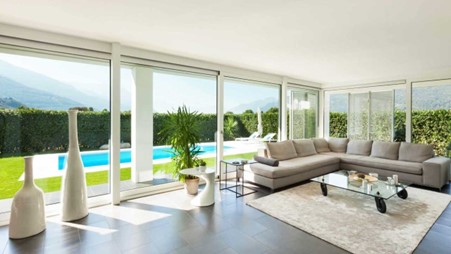We all know that windows are an essential component of any décor, whether it be in your home or place of business, as they serve as a climate barrier that shields you and your property from the extremes. A perfect window can increase the value of your house while also assisting with energy savings. Windows come in a variety of various shapes, dimensions, and styles, but deciding on the proper framing substance is just as crucial and should not be taken lightly as selecting the proper glass.
Typically, windows are made of aluminum, wood, or uPVC and it is your personal choice to choose which material you want to invest in. You should keep in mind that every material possesses its advantages and disadvantages, but ultimately, it comes down to what fits you the best. If you are confused about choosing the right sliding window for your home, you are at the right place as we are going to clear all your doubts in this article!
Aluminum Sliding Window: All About It
Aluminum sliding windows are renowned for their robustness and long lifespan. They come in a wide variety of dimensions and varieties and are very lightweight. Other substances cannot match the wide range of architectural criteria that aluminum can be produced to suit. They may also be powder painted in a variety of colors to fit any design and are completely customizable. They also demand less upkeep, and with adequate care, they can live for many years.
Pros:
- Lightweight, stylish, inexpensive, and cheap.
- Environmentally favorable compared to wood and uPVC.
- Weathering and chipping resistant.
- Available in a variety of styles
- Nearly no money is spent on upkeep.
- Since aluminum is completely recyclable, it is beneficial for the environment.
- Aluminum is a non-rusting substance.
- Aluminum has excellent fire resistance.
Cons:
- Due to its high thermal conductivity and poor thermal insulation, aluminum is a good heat conductor.
- Need upkeep if the anodization deteriorates.
- It gets quite cold in freezing circumstances, making it unsuitable for cold weather.
uPVC Sliding Window: All About It
uPVC, a low-cost variety of white plastic, is frequently used in white window frames all over the nation. Due to its perfect look and lack of need for routine paintwork or greasing, uPVC requires less maintenance. Your window will remain as fresh as ever if you simply clean it down with a towel dampened with any detergent. uPVC windows typically cost much less than aluminum or wood windows while also providing great insulation. It has a very elevated surface finish and blends beautifully with trendy and modern decor. Compared to the other two, uPVC is the least expensive material in terms of price.
Pros:
- Less upkeep and simple to clean.
- Compared to aluminum windows and wooden windows, this material offers your home better heat insulation.
- Because of its UV-resistant mix, uPVC windows do not deteriorate even after prolonged sun exposure.
- Doesn’t rust, rot, or corrosion.
- Provides excellent security options.
- Obtainable in a variety of designs and adaptable to your requirements.
- Waterproof and ideal for coastal settings.
Cons:
- As compared to hardwood and aluminum fixtures, it doesn’t increase your property’s resale value.
- Much more fragile than other materials.
- Fewer customization options than its competitors.
Wooden Sliding Window: All About It
Since they are more adaptable than windows made of aluminum and uPVC, wooden sliding windows with grills continue to be in demand. Wooden doors and windows have been used for generations because they are a natural, easily accessible material that also gives your home’s interiors a more upscale, stylish, and elegant look than other materials. Wooden windows offer a glitzy finish to your design by fusing beauty with functionality, as well as helping to brighten up a specific wall or a drab spot.
Pros:
- Wooden windows are extremely strong and energy efficient.
- They do not tarnish or corrode as time goes on.
- To complement the style of your home, wooden windows can be made in any size or color.
- Because wood doesn’t conduct heat well, wooden windows and doors use less energy than aluminum ones.
- If treated properly, wooden windows will last much longer and can assist in boosting the worth of any property they are installed.
Cons:
- Calls for routine polishing and painting.
- Wooden windows are much pricier than aluminum and uPVC
- Termites are a big threat to wooden windows.
Maintenance of Aluminum, uPVC Windows, and Wooden Windows
Maintaining windows can be a deciding factor for many homeowners, as it directly impacts the longevity and aesthetics of the installations:
-
uPVC Windows:
One of the major benefits of uPVC windows is their low maintenance needs. They do not require painting or staining and can be easily groomed with mild soap and water. uPVC is resistant to rot, rust, and fading, making it a long-lasting and hassle-free option.
-
Aluminum Windows:
Like uPVC, aluminum windows are relatively low maintenance, thanks to the metal’s natural corrosion resistance. Cleaning them occasionally with mild detergent will keep them looking new for years. However, coastal areas may require more attention, as salt water can accelerate corrosion.
-
Wooden Windows:
Wooden windows demand regular maintenance to ensure their longevity and beauty. They must be repainted or stained every few years to save the wood from moisture and prevent rot. Additionally, wooden windows may be vulnerable to termites and other pests, requiring proactive measures.
Applications of Aluminum, uPVC Windows, and Wooden Windows
uPVC Windows:
- These windows boast exceptional thermal insulation properties, reducing heat transfer and maintaining a comfortable indoor temperature. Their multi-chambered design further enhances insulation, keeping your home cozy in winter and cool in summer. The airtight seal prevents drafts, contributing to overall energy efficiency.
- uPVC windows offer various design options, from simple and modern to intricate and traditional styles. They are available in various colors and finishes to complement any architectural style.
Aluminum Windows:
- Aluminum windows offer good strength and durability but are not as naturally energy efficient as uPVC. However, technological advancements have led to the development of thermally broken aluminum windows, where an insulating material is placed between the inner and outer parts of the frame to improve energy efficiency.
- Aluminum windows are known for their sleek and contemporary appearance, making them a popular choice for modern and minimalist designs. They come in various powder-coated finishes to match your home’s color scheme.
Wooden Windows:
- Wooden windows, being natural insulators, provide decent thermal performance. However, they may require additional maintenance to prevent moisture absorption, which can affect their insulation capabilities over time.
- Wooden windows exude timeless charm and a sense of warmth that is hard to replicate. They are highly customizable, allowing you to pick from different wood species and paint or stain colors to suit your home’s character.
Aluminum, uPVC, And Wooden Windows: Difference Among Them
Let us have a look at a few point-to-point differences between Aluminum, uPVC, and wooden windows so that you can easily choose the right one for your home.
| Basis Of Difference | Aluminum Windows | uPVC Windows | Wooden Windows |
| Durability | Compared to wood and uPVC windows, aluminum windows are stronger and more lasting. | Compared to aluminum windows, uPVC windows are less strong and durable. | Compared to uPVC windows, wooden windows are more robust and long-lasting. |
| Paint Or Finish | Powder coating or anodizing is required for aluminum windows. | Painting or polishing is not necessary for uPVC Windows. | Windows made of wood need to be polished and painted. |
| Impact Of Moisture | All aluminum alloys can be attacked by water with a higher pH. | uPVC doesn’t expand as a result of moisture. | Wood, on the other hand, is porous, therefore when it comes to windows, it collects water and swells. It becomes difficult to close the window once it has expanded. |
| Effect Of Weather | Unlike aluminum windows, which can rust if the powder coating is broken despite being built to survive some harsh circumstances. | uPVC windows are ideal for all environments, especially coastal places, and may be utilized in any weather. | In areas that get significant rainfall and those that are near the seaside, wooden windows cannot be used. |
| Smoothness Of Operation | Aluminum windows are noisy and susceptible to moisture. | Windows made of uPVC can be opened and closed quietly. | Wooden windows are noisy when they operate because they are not smooth. |
| Swelling Or Shrinkage | In comparison to uPVC, aluminum has a much higher thermal expansion coefficient which might cause material deformation if not produced and implemented correctly. | Because uPVC does not swell and compresses as much as wood or aluminum, the frame can hold its shape. | Wood’s natural ability to absorb moisture or swell and shrink results in deformation and gaps over time. |
Why Choose AIS Windows?
We can say that aluminum, uPVC, and wooden windows each offer unique benefits and downsides. So, you should come up with a decision depending on your personal needs. It is ultimately up to each person to choose which is the wiser choice based on their preferences, budget, taste, demands, requirements, and a variety of other factors. Based on the same, you can get a sliding window with grills or without them.
Once you decide which type of window you want to invest in, there arises another important question. Well, yes, you heard it right! You need to decide which provider or seller you want to approach for your windows. Before you invest in a provider, make sure that they are reliable and offer high-quality material like AIS Windows does.
You can contact us to ask questions such as sliding window price per sq. ft. We have been there in the market for a long time now and have myriads of happy customers. We value our clients and that’s why customer satisfaction is more important to us than profit.




Leave a Reply